Are you looking to strengthen your bones and boost your overall health? Osteoporosis is a silent condition that affects millions, but the good news is that there are simple and effective steps you can take to prevent it. From incorporating calcium-rich foods into your diet to engaging in weight-bearing exercises, making a few lifestyle adjustments can significantly impact your bone density. Curious to learn more about these osteoporosis prevention tips? Keep reading!

Balanced Nutrition and Calcium-Rich Diet
Osteoporosis prevention relies heavily on balanced nutrition, particularly a diet rich in calcium, which is crucial for bone health. Adults require approximately 1000 mg of calcium daily, increasing to 1200 mg for women over 50 and men over 70. Dairy products, such as milk (approximately 300 mg per cup), yogurt (around 400 mg per cup), and cheese (about 200 mg per ounce), serve as primary sources of calcium. Moreover, leafy greens like kale and collard greens, which provide around 250 mg per cup when cooked, are excellent alternatives for non-dairy options. Additionally, fortifying foods, such as certain brands of orange juice and cereals, often contain added calcium, contributing up to 500 mg per serving. Vitamin D, which enhances calcium absorption, is also crucial for osteoporosis prevention. Sunlight exposure generates approximately 1000 IU of vitamin D per 15 minutes of direct sunlight. Incorporating these dietary strategies can significantly strengthen bones and reduce the risk of fractures and osteoporosis-related complications.
Regular Weight-Bearing and Muscle-Strengthening Exercises
Regular weight-bearing exercises, such as brisk walking (30 minutes daily), enhance bone density by stimulating cells like osteoblasts to form new bone tissue. Additionally, muscle-strengthening activities, including resistance training with weights or resistance bands (at least twice a week), increase muscle mass and provide support to bones, reducing the risk of fractures. Incorporating activities like dancing or hiking not only improves balance but also promotes coordination, further minimizing fall risk. Activities designed for seniors, like tai chi, can reduce falls by improving stability. Maintaining a healthy diet rich in calcium sources like dairy products (1000-1200 mg daily for adults) and vitamin D, crucial for calcium absorption, completes a comprehensive osteoporosis prevention strategy. Regular check-ups can help monitor bone density with tests like dual-energy X-ray absorptiometry (DEXA), assessing bone health effectively.
Lifestyle Modifications: Quit Smoking and Limit Alcohol
Quitting smoking significantly enhances bone health by promoting better circulation and reducing inflammation, crucial for maintaining bone density. Studies indicate that smoking can lead to approximately 20% lower bone mineral density in adults, especially in the spine and hip regions, making fractures more likely. Limiting alcohol consumption is equally important; excessive intake can interfere with calcium absorption and disrupt hormone balance. Research shows that consuming more than two alcoholic beverages per day increases the risk of osteoporosis and fractures, especially in individuals over 50. Health organizations, including the National Osteoporosis Foundation, recommend a balanced lifestyle that incorporates nutritious diets rich in calcium and vitamin D, along with regular weight-bearing exercises to strengthen bones and prevent osteoporosis effectively.
Bone Density Testing and Monitoring
Bone density testing plays a critical role in osteoporosis prevention, particularly for individuals aged 50 and older or those with risk factors such as family history. Dual-energy X-ray absorptiometry (DEXA) scans measure bone mineral density (BMD) in locations such as the lumbar spine and hip, serving as a key indicator of bone health; a T-score below -2.5 signifies osteoporosis diagnosis. Regular monitoring, typically every one to two years, enables healthcare professionals to assess changes in bone density, adjust treatment plans, and implement proactive measures. Lifestyle modifications, including dietary changes to increase calcium and vitamin D intake, alongside weight-bearing exercises, should be discussed to promote bone strength. Awareness of medications such as bisphosphonates and RANK ligand inhibitors can also aid in enhancing bone density and minimizing fracture risk, ensuring a comprehensive approach to osteoporosis prevention.
Sunlight Exposure and Vitamin D Intake
Sunlight exposure plays a crucial role in osteoporosis prevention, particularly due to its relationship with vitamin D synthesis, essential for calcium absorption. Vitamin D deficiency is common, affecting millions globally--approximately 1 billion people as estimated by the World Health Organization. Regular, moderate sunlight exposure, around 10 to 30 minutes several times a week, can significantly enhance vitamin D levels. For individuals living in regions with limited sunlight, especially during winter months, dietary sources rich in vitamin D, such as fatty fish like salmon (approximately 570 IU per 100g), fortified dairy products, and supplements can effectively bridge the gap. Furthermore, maintaining a balanced intake of calcium, ideally around 1,000 mg daily for adults, complements vitamin D's benefits in strengthening bone density and reducing the risk of fractures.
Letter Template For Osteoporosis Prevention Tips Samples
Letter template of essential osteoporosis prevention guidelines for adults
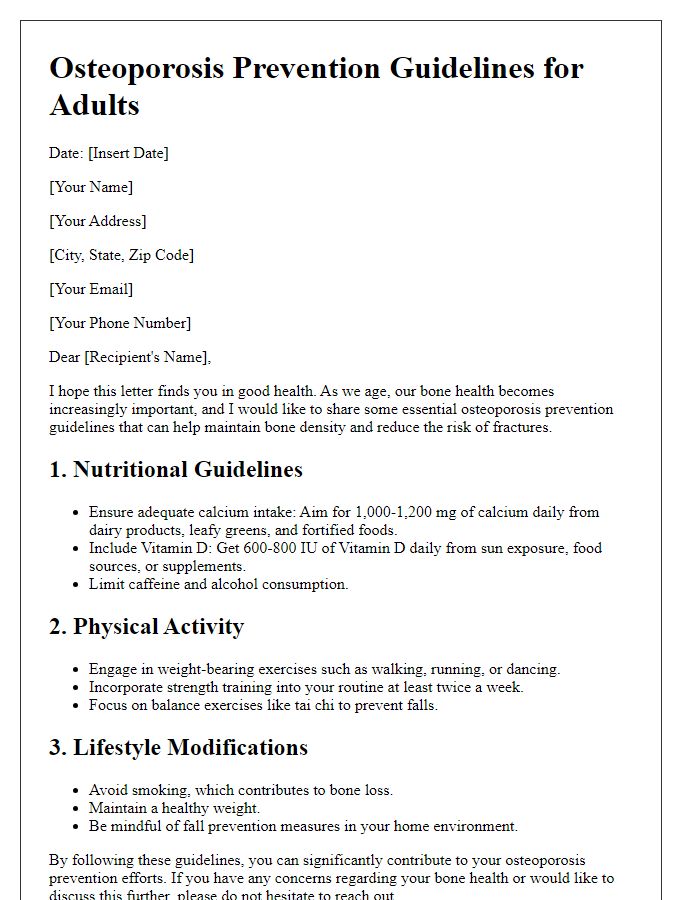

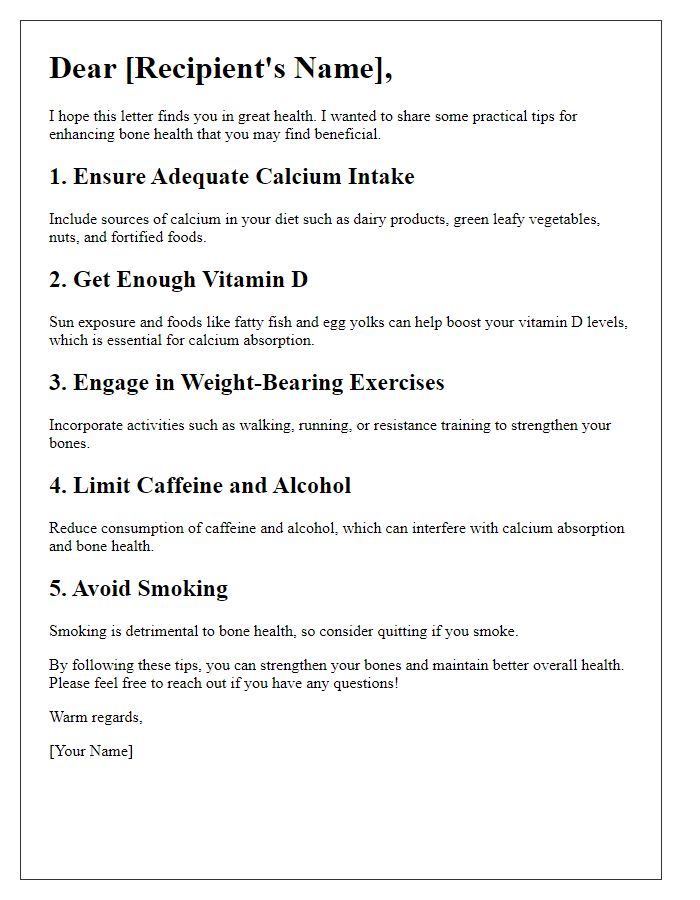
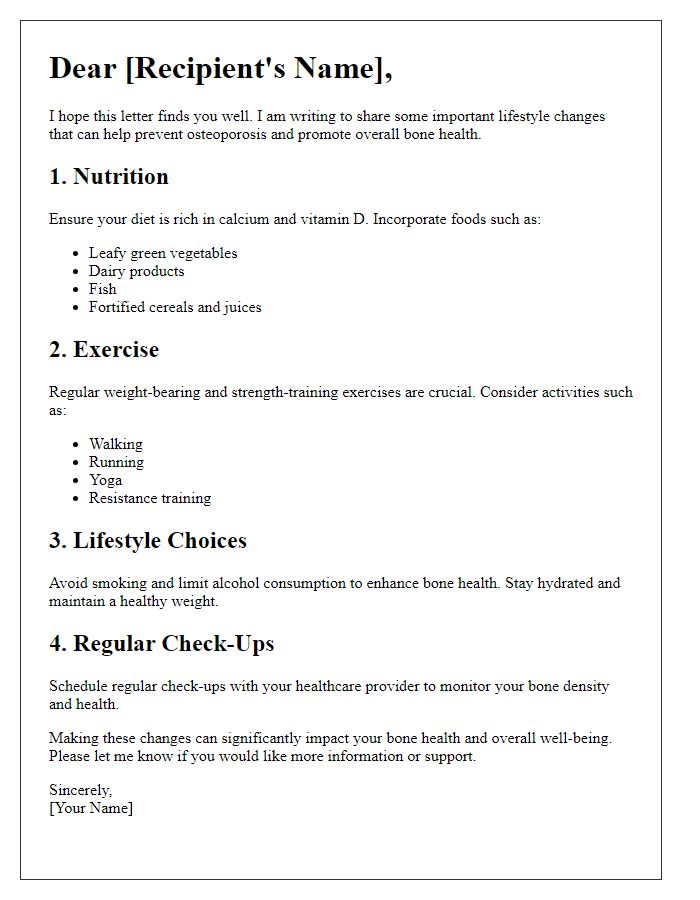
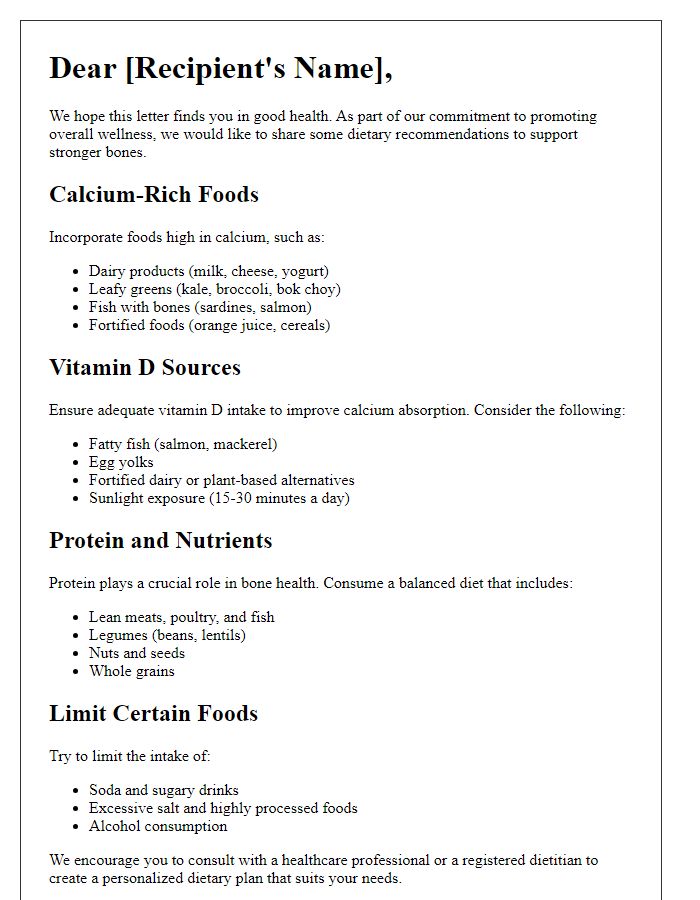
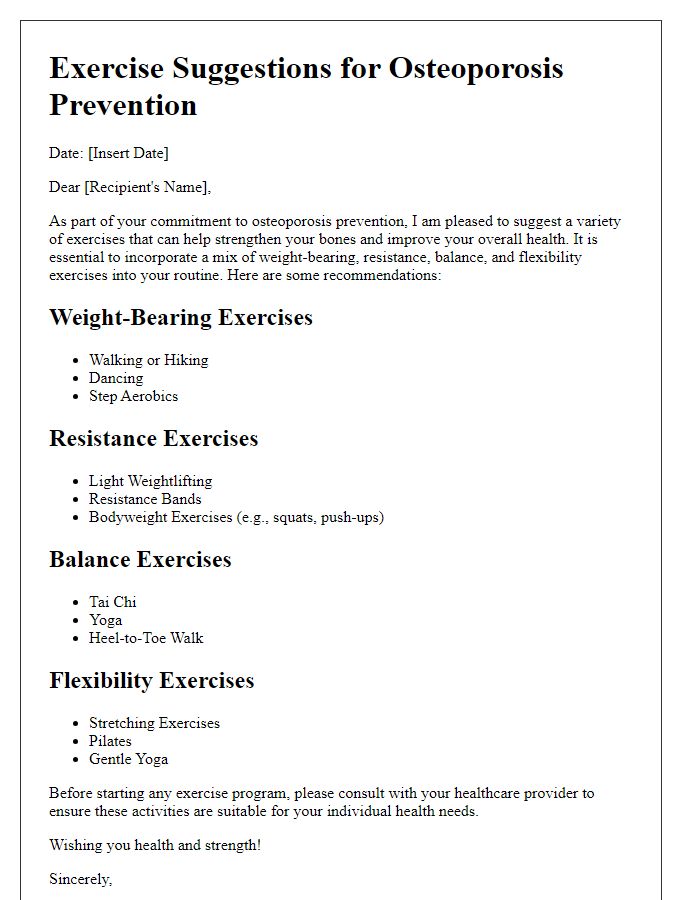
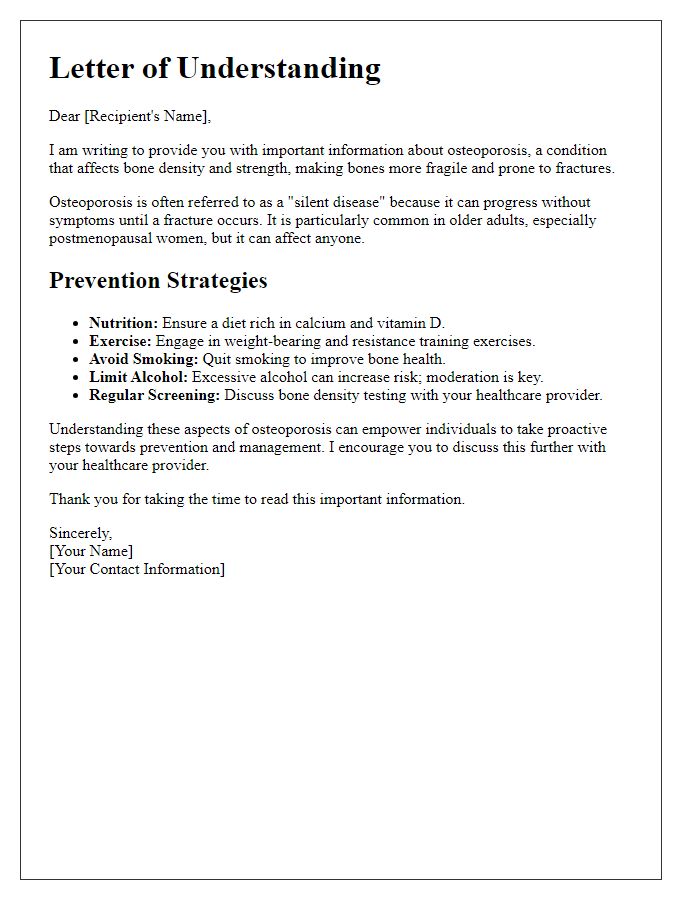
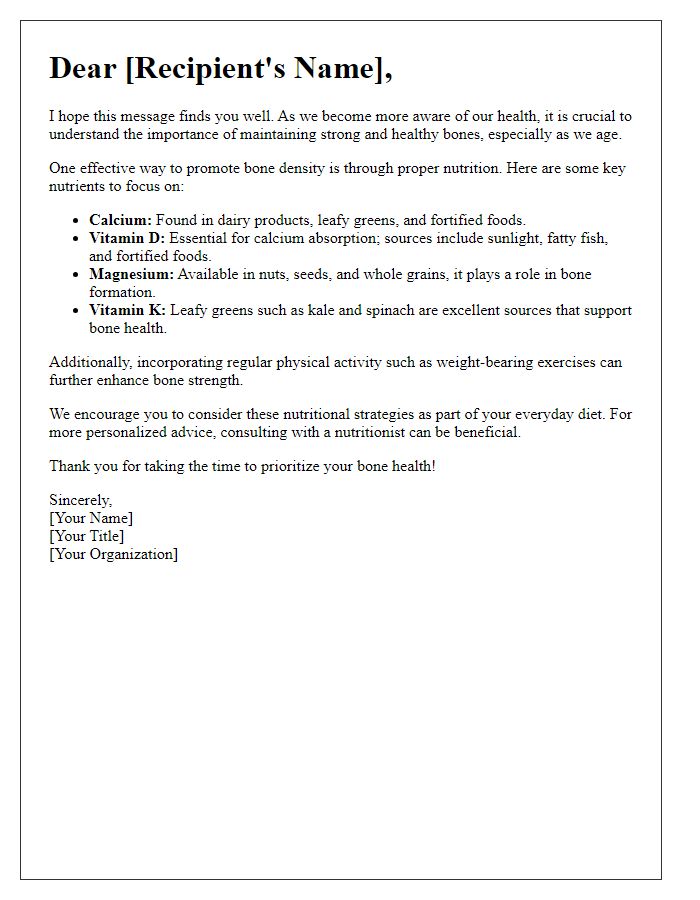
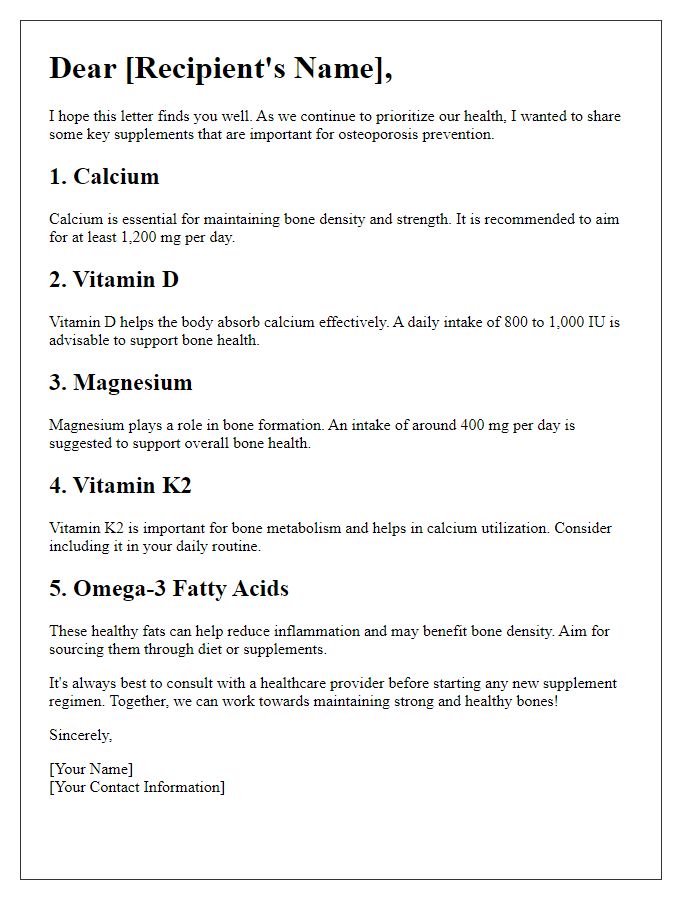
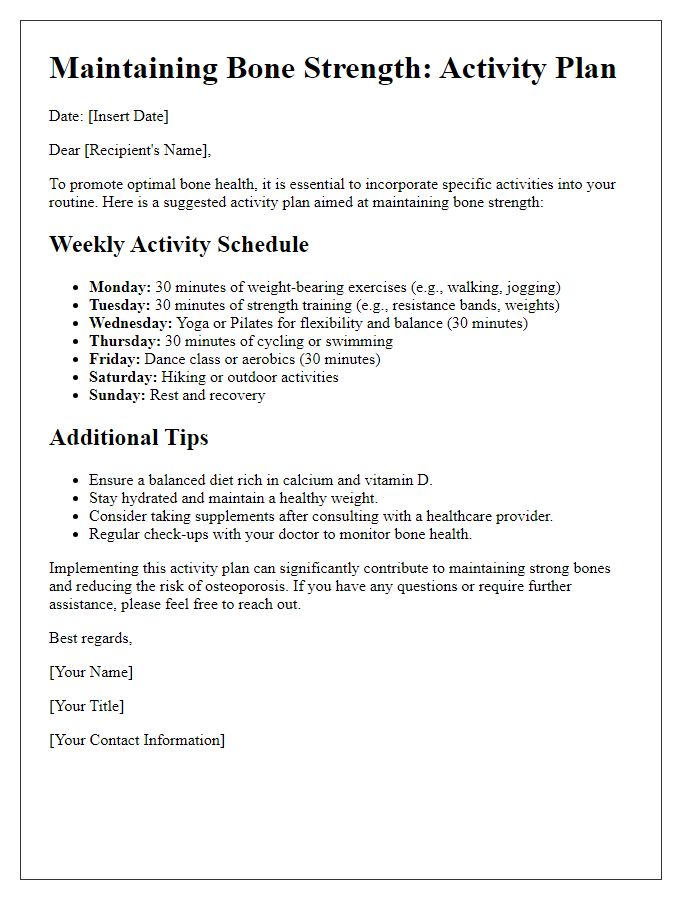
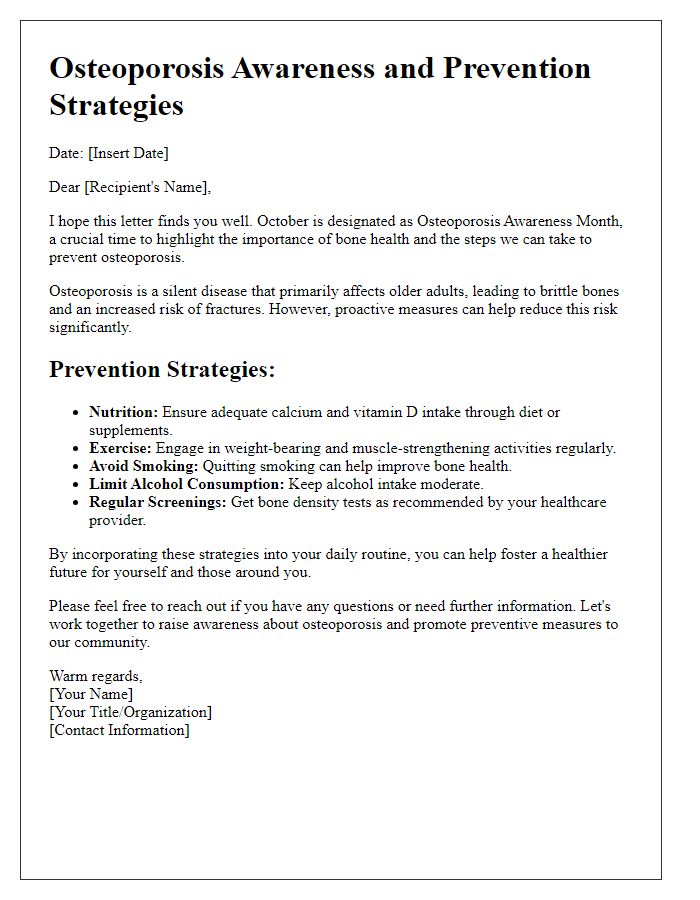


Comments